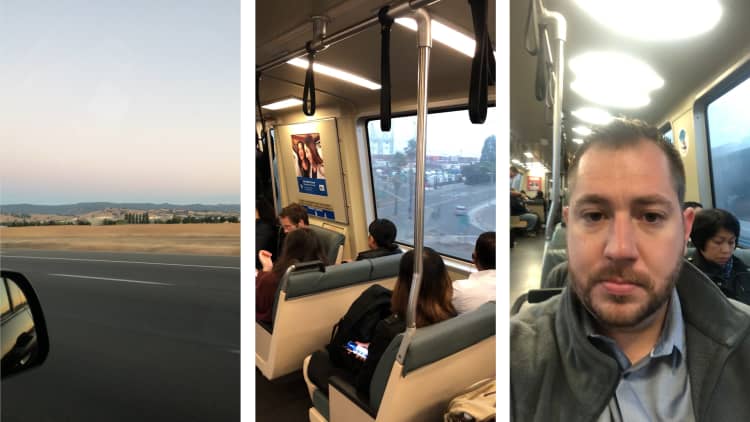American workers are quitting at the highest rates since 2001. According to the Job Openings and Labor Turnover Survey (JOLTS) from the Bureau of Labor Statistics (BLS), 2.4 percent of the workforce quit in September and 2.3 percent quit in October.
Today, roughly 3.5 million Americans quit their jobs every month.
One major reason that so many workers are voluntarily leaving their jobs is because in the current tight labor market, the easiest way for workers to get a raise is to get a new job. "For many, it's a smart move, as there's a clear advantage to increasing your earning potential by switching jobs," Andrew Chamberlain, chief economist at Glassdoor, tells CNBC Make It.
But there are many other reasons that workers are willing to pack up their cubicles, among them, painful commutes.

Human resources consulting firm Robert Half surveyed over 2,800 Americans across 28 major U.S. cities and found that 23 percent of workers have quit a job because of a bad commute. Chicago had the largest number of workers who said they had left a job because of a bad commute, followed by Miami, New York and San Francisco.
Men were more likely than women to indicate that they have quit because of their commute with 28 percent of men saying yes, compared to just 20 percent of women.
Age also had a significant impact on a worker's likelihood of quitting because of their commute. Over a third (34 percent) of respondents between the ages of 18 and 34 said they have quit a job because of the commute while 24 percent of those between 35 and 54 have and just 12 percent of those over the age of 55 have.
Of these workers between the ages of 18 and 34 however, 56 percent said that their commute to the office has improved over the past five years. Miami residents reported the biggest improvements, with 66 percent saying that their commutes have gotten better over the past five years.
While this may be true for Miami, data suggests that overall, commute times have modestly but steadily increased over the past several decades. According to the U.S. Census, in 1990 the average commute time was less than 22 minutes. Today, Americans spend just over 26 minutes commuting to work each way.
These four extra minutes spent on commuting equates to eight minutes a day (4 x 2) round trip, 40 (8 x 5) extra minutes each week and 2,080 (40 x 52) extra minutes of commuting each year. This means that commuters now are spending 34.6 more hours in transit — a whole work week — than workers in the 1990s.
This modest but still significant increase in commute times has a significant impact on workers. Vox's Kimberly Mas points out that commuting has been linked to obesity, stress, anxiety, depression, higher blood pressure, higher rates of divorce, neck and back pain and shorter lifespans.

One study found that adding 20 minutes to your commute makes you as miserable as taking a 19 percent pay cut. Nobel laureate Daniel Kahneman and economist Alan Krueger once surveyed 900 people and found that commuting was their least favorite activity of all, behind work, child care and home chores.
"Commutes can have a major impact on morale and, ultimately, an employee's decision to stay with or leave a job," Paul McDonald, senior executive director for Robert Half says in a statement. "In today's candidate-driven market, skilled workers can have multiple offers on the table. Professionals may not need to put up with a lengthy or stressful trip to the office if there are better options available."
McDonald added, "To help ease commuting woes, companies can offer remote work options, flexible scheduling or transportation amenities."
Like this story? Subscribe to CNBC Make It on YouTube!
Don't miss:



